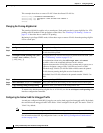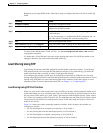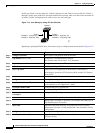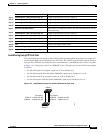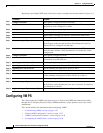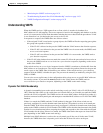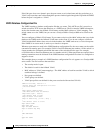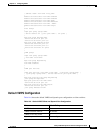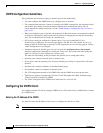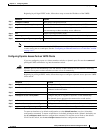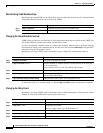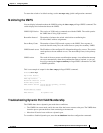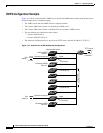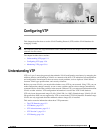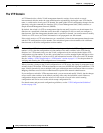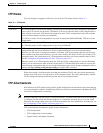
14-28
Catalyst 2950 Desktop Switch Software Configuration Guide
78-14982-01
Chapter 14 Configuring VLANs
Configuring VMPS
VMPS Configuration Guidelines
These guidelines and restrictions apply to dynamic port VLAN membership:
• You must configure the VMPS before you configure ports as dynamic.
• The communication between a cluster of switches and VMPS is managed by the command switch
and includes port-naming conventions that are different from standard port names. For the
cluster-based port-naming conventions, see the “VMPS Database Configuration File” section on
page 14-26.
• When you configure a port as dynamic, the spanning-tree Port Fast feature is automatically enabled
for that port. The Port Fast mode accelerates the process of bringing the port into the forwarding
state. You can disable Port Fast mode on a dynamic port.
• 802.1X ports cannot be configured as dynamic ports. If you try to enable 802.1X on a
dynamic-access (VQP) port, an error message appears, and 802.1X is not enabled. If you try to
change an 802.1X-enabled port to dynamic VLAN assignment, an error message appears, and the
VLAN configuration is not changed.
• Trunk ports cannot be dynamic ports, but you can enter the switchport access vlan dynamic
interface configuration command for a trunk port. In this case, the switch retains the setting and
applies it if the port is later configured as an access port.
You must turn off trunking on the port before the dynamic access setting takes effect.
• Dynamic ports cannot be network ports or monitor ports.
• Secure ports cannot be dynamic ports. You must disable port security on a port before it becomes
dynamic.
• Dynamic ports cannot be members of an EtherChannel group.
• Port channels cannot be configured as dynamic ports.
• The VTP management domain of the VMPS client and the VMPS server must be the same.
• VQP does not support extended-range VLANs (VLAN IDs higher than 1006). Extended-range
VLANs cannot be configured by VMPS.
• The VLAN configured on the VMPS server should not be a voice VLAN.
Configuring the VMPS Client
You configure dynamic VLANs by using the VMPS (server). The switch can be a VMPS client; it cannot
be a VMPS server.
Entering the IP Address of the VMPS
You must first enter the IP address of the server to configure the switch as a client.
Note If the VMPS is being defined for a cluster of switches, enter the address on the command switch.



